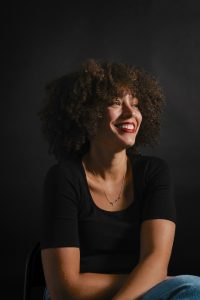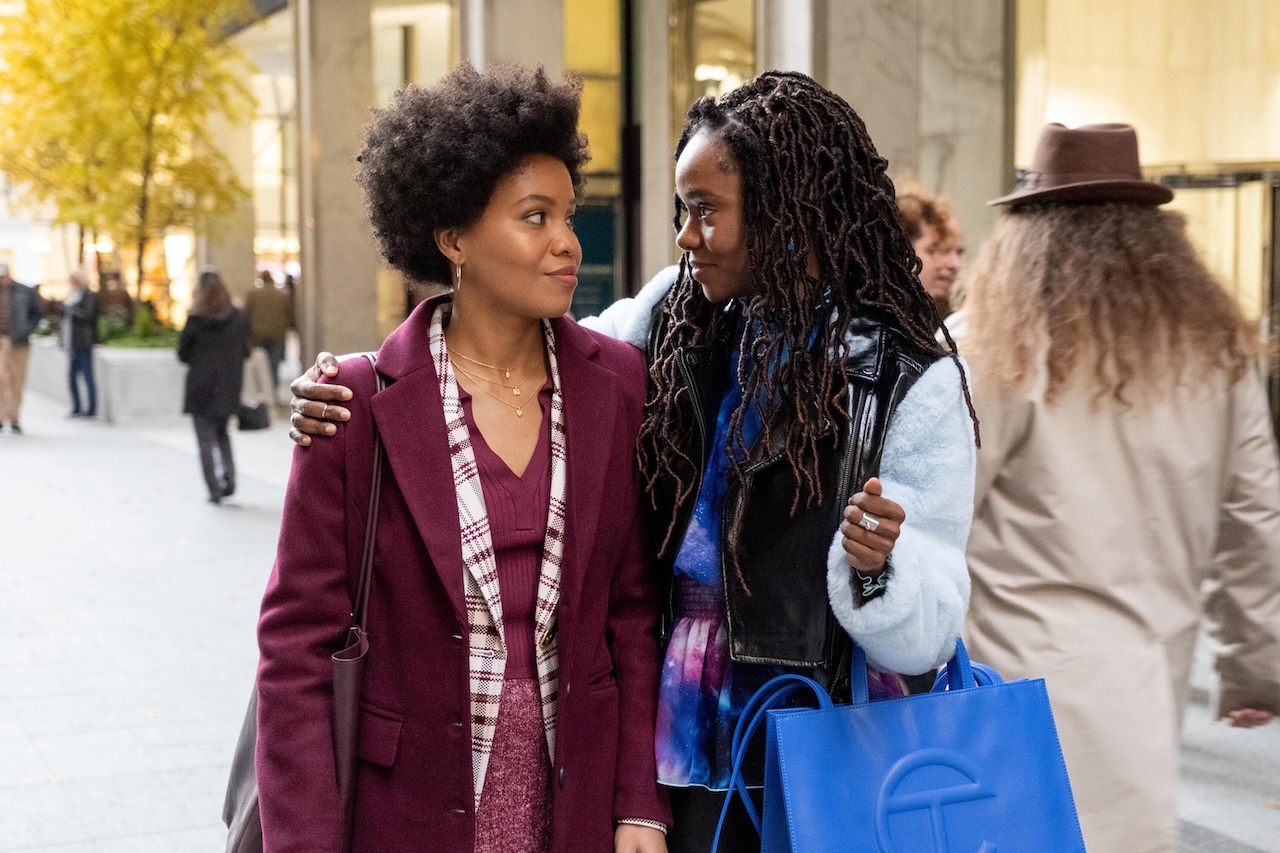The Other Black Girl is a story of black sisterhood when Nella (Sinclair Daniel), an editorial assistant at Wagner Books, who is tired of being the only black girl and becomes excited when Hazel (Ashleigh Murray) joins her team. Their bond would allow her to share her experiences and make her feel less alone. Prolific TV writers Gus Hickey and Jordan Reddout (Queens, Mixed-ish) spoke with Creative Screenwriting Magazine about creating their workplace thriller.
Genre & Tone
“The thing that prepared us most for writing, specifically the tone of The Other Black Girl, which is a real blend of comedy, thriller and mystery was actually a pilot that we wrote that never got made,” recalls Jordan. The pilot was a “rape revenge comedy” about a woman who was raped in college and ten years later, she and her friends decide to kill the rapist because he was never brought to justice. “I promise it was funny,” assures Jordan.
The casserole of genres and tones filled with unlikely ingredients is Hickey and Reddout’s signature style, making The Other Black Girl a natural extension of their writing interests. “It’s a personal goal of ours because if you are not laughing at the world, you’re definitely crying,” she continues. “We enjoy tackling these heavier issues with comedy because I think if you can’t laugh or smile, then you have no hope.”

Jordan Reddout
Jordan Reddout and Gus Hickey have no issue with being tonal chameleons throughout their screenwriting careers. In fact, they embrace it. They’ve worked on broad comedies like Will & Grace and The Muppets. “The thing that prepares you the most for showrunning a show is not being precious about your material and knowing that it’s going to change and that it’s going to continue to change,” declares Reddout. Changes happen on set, during a read through, and in post-production.
Adapting The Novel
The Other Black Girl began its creative life as a novel by Sakaya Dalila Harris, who co-developed the TV series with Rashida Jones. “Sakaya was in the writers’ room with us the whole time and wrote a couple episodes, so it was very collaborative with her throughout the process because she was there pitching ideas and giving feedback in real time,” explains Jordan.
“Rashida was very present in the beginning and had a lot of opinions about what she saw the show being, and they really aligned with us, which I think is part of why we got the job. All of our tonal concepts were very similar. We had all just seen Severance and thought that this could ride on Severance’s coat tails in a way,” continues Jordan.
Jones was eventually pulled away to shoot another TV show in Tokyo so was absent from Black Girl for most of the development, writing, and production stages. She returned during post-production.
“Zakiya had worked on this project for many more years and had tons of thoughts of how to expand the story and further explore characters with ideas that didn’t make it into the book,” mentions Hickey.
Although Hickey and Reddout had the perfect co-creators, there are logistical considerations in adapting a novel into a television show. “We have to pull out the most important stuff and leave the non-cinema,” says Gus. “Novelistically, you can do a lot more with a character’s interiority, you can really live inside that person’s head for as long as you want, and you can’t really do that necessarily in television. Everything has to be much more active, visual, and much more present,” he elaborates.
Other practical concerns with creating a TV series are inserting a cliffhanger at the end off each episode and allowing enough screen time to show each character’s perspective. “Nella is making a choice in every single episode, moving forward and having an arc towards the end that’s going to be shaped differently than an arc for a novel,” adds Hickey.
The Pilot Episode
Fortunately, Zakiya and Rashida were available to mold the first episode of the season into shape. Nella confronts writer Colin Franklin (Brian Baumgartner) about some problematic elements in his revered book. Nella confronts Hazel thinking she has her support, but instead, she throws Nella under the bus by agreeing with her superiors that the book was fine.
“That scene happens almost 250 pages inyo the book, so Zakiya and Rashida made the decision to burn through a lot of internal debates that Nella goes through in the first episode,” says Gus.

Gus Hickey
Aside from the more contemplative nature of Nella’s world in the novel, “The Nella of the book and the Nella of our show are two pretty different people, and I think that that’s what led to the finale being very different to the end of the book. In the show, Nella is more active and less cautious. In the book, she’s more reserved and scared to put a toe out of line,” adds Jordan.
The world has also changed dramatically since the book was published in 2019. “There was this huge racial reckoning in our country in 2020, and specifically within corporate America in terms of who is in those positions now,” says Reddout. Gen Z is taking over these positions from millennials and they have a vastly different approach to work/ life balance. Traditional career ladders have been eliminated.
Romancing The Tone
“It’s thriller first and then comedy and then horror, especially early on when Nella has no idea what’s going on and she can’t tell whether or not these things are happening in real life or not. There is a supernatural sort of horror element to it,” says Gus.
“It all depends on Nella’s perspective and her POV, and as long as you keep her specific, smart, logical and true to her character, you can get away with the genre shifting because as long as she’s reacting rationally in the moment to these insane things that are happening to her, she will react to them with comedy, she will react to them with humor, she’ll react to them with fear, she’ll react to them with any number of reactions,” he expands.
“I also think the fact that the actual thriller things that are happening to Nella are so far outside of the realm of the physical world of possibility make the comedy even more necessary because we identify with her so much that we want her to notice how ridiculous some of these things are and that can also lead to comedy.”
Jordan Reddout adds that they came up in the world of comedy, so it’s second nature to them, even when they’re writing dramatically. “It’s very hard not to put a joke at the end of every scene because that’s been so drilled into us and it just exists in our muscle memory at this point. The thriller aspect, the mystery, was all a bit more challenging for us.”
In order to keep the tone in check, the writing duo made color-coded diagrams of the spooky things that could happen during the season.
On Theme
The Other Black Girl embodies aspects of being “othered” as is apparent by its title. But thematically, the show taps into a deeper vein. “The book obviously explores this theme of being the only black person in a white office,” states Jordan. “Gus was the only man and one of two white people in the writers’ room. Nearly everyone else was a black woman. Our support staff included a Latina and an Asian American woman.”
Workplace demographics have changed since the book was written, but being the only black employee in the workplace is still happening.
“We also wanted to pose the question of just how much of yourself are you willing to sacrifice in order to succeed in your career,” says Gus. “I think that every single character answers that question differently. There’s no right answer, but there are wrong answers. Hopefully the show explores some of those wrong answers, but we also wanted to make sure that we understood why each character makes that decision because they’re all trying to get to the same place. Everybody has their own set of values and brings their own baggage to that question,” elaborates Gus.
How much of your authentic self will you tamp down to get by and get ahead?
Nella & Hazel
The tenuous and changing nature of Nella and Hazel’s relationship is seen throughout the show. They are outcasts bound by race. “Nella, at the beginning, has spent years of her life stomaching injustices and she’s on a career path,” says Jordan. “But I think she is desperate for a deeper connection. I think her deepest connection at work is probably Vera Parini (Bellamy Young). It’s not ideal, but I do think we see that there was some sincerity to Vera’s mentorship.” That’s why Nella is so relieved when Hazel arrives.

Vera Parini (Bellamy Young) Photo by Wilford Harwood/ Hulu
“We are with Nella on her emotional, psychological journey of trying to figure out what’s really happening with this girl and asking whether Nella and Hazel are friends or enemies.”
“Once we get Hazel’s backstory, we see her situation is a bit more desperate. She’s coming into it having sacrificed everything in her life to follow black author Diana Gordon (Garcelle Beauvais) and reap the benefits of being one of her minions.”
“When Hazel starts the season, she actually is trying to do Diana’s will, but she also is genuinely searching for a friendship with Nella too,” clarifies Jordan. There’s a nuanced examination of the power dynamics is friendships.
Both Nella and Hazel ostensibly achieve their goals at the start of the season, but they have yet to determine whether their efforts were worth it. Was any of those lives that Hazel possibly destroyed worth it worth the outcome?
“Nella gets promoted, she gets the imprint, she gets the book published, she gets everything she wanted, but it’s like, ‘Oh, I had to completely change who I am and completely lie about myself to get to where I am,” notes Hickey.
“Hazel concludes, ‘I finally got a friend. I got a life, I got a real job, and I got a friend and I can be in this insane Diana plot with somebody else.‘”
“Hazel states her life philosophy multiple times. If Nella was paying attention, she might have figured out what was going on earlier. But I think there’s a scene in episode three where they’re sitting on the stairs at a party and Nella says, ‘I’ve wasted all this time. I’m never going to make it.’ And Hazel responds, ‘Why don’t you let me help you? And we can both make it,‘” continues Hickey.
There’s a “winner takes all “notion that if one succeeds, the other must logically lose. “Despite her underhanded tactics, Hazel’s goal is to make it easier for other people to succeed and to lift everybody up with her. Nella ostensibly is the person we want to succeed. But in her mind, she hasn’t even opened up to the possibility it not being just about her.”
“Nella’s such a dreamer. I think she also states her life philosophies a few times throughout the show. She’s constantly making speeches about what she wants the world to look like. And I think she goes in the beginning from being someone who is only going to maybe make a speech when pressed, to someone who takes action at the very end of the season and fights back in a concrete way that she could not do before,” concludes Reddout.
